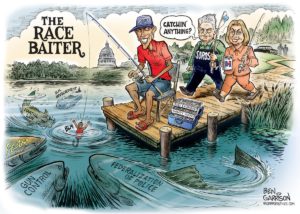Matt Drudge used to be a conservative but he came to see that conservatism doesn’t conserve anything.
I think the re-election of Barack Obama was a turning point for people like Matt Drudge.
Matt Drudge does not care.
That’s the clear message delivered on his website Monday morning, after a legion of fellow conservatives ripped him for putting an inflammatory “Black Lives Kill” banner atop his homepage last Friday.
While most news agencies have identified the gunman who killed five Dallas police officers last week as Micah Johnson or Micah Xavier Johnson (his full name), Drudge is calling him “Micah X,” a clear reference to the late civil rights leader Malcolm X. The lead photo on the Drudge Report featured African Americans raising their fists — flashing the black power salute popularized by the Black Panthers in the 1960s — and holding an image bearing the faces of President Obama and Martin Luther King Jr.
Headlines and links focused on a few themes: Black Lives Matter is a hate group full of troublemakers, black nationalists want to form their own country, and police — nay, people all over the world — don’t like Obama.
Philip Bump writes for the Washington Post:
A recurring theme of extreme criticism of President Obama over his two terms has been that he secretly harbors hostility toward things central to the American identity. He secretly hates Christianity. He secretly hates the Constitution. He secretly hates America itself…
In July 2009, historian Henry Louis Gates, who is black, was arrested while trying to force his way into his own home in Cambridge, Mass. (The door was jammed.) As the incident gained national attention, Obama weighed in, saying that the arresting officer had “acted stupidly” for handcuffing and booking Gates. Probably in large part thanks to the political value of defending police officers, the comments quickly metastasized, with former Michigan congressman Thaddeus McCotter introducing a resolution in the House demanding that Obama apologize for his comments. The National Republican Senate Committee used Obama’s remarks to mobilize its base, asking Americans to sign a petition if they thought it was inappropriate for “our nation’s Commander in Chief to stand before a national audience and criticize the men and women in law enforcement who put their lives on the line every day.” Obama defused the controversy in part by inviting Gates and the arresting officer to a “beer summit” at the White House.
The following April, conservative radio host Rush Limbaugh suggested that perhaps a “tequila summit” was also in order, because of comments Obama made about Arizona’s just-passed law that cracked down on immigrants in the country illegally.
“Barack Obama, ladies and gentlemen, he’s got something in for the cops, there’s no question,” Limbaugh said. “You go back to Cambridge. This guy’s got some problem with police officers.” Why? Because Obama worried that Hispanic Americans in Arizona would be harassed “if you don’t have your papers, and you took your kid out to get ice cream.”
Limbaugh:
“So that’s his argument, to create a phony hypothetical where families getting ice cream are hassled by stupid, bigoted policemen. This is gonna require a massive tequila summit before this is all over. We had a beer summit up in Cambridge. So Obama’s now not satisfied with just attacking a state. He has to attack their police as well. I’ll tell you what’s poorly conceived here, is Obama’s views on the cops. He thinks all these cops are going to act stupidly. This is an outrageous answer, this is an outrageous thing.”
In 2011, the idea took another turn. Leveraging long-dormant worries about violent rap music, critics of the president decried his inviting the rapper Common to the White House as part of an event celebrating poets. Critics of Obama seized upon Common’s track “A Song for Assata,” dedicated to Assata Shakur, who was convicted of killing a police officer and who then fled to Cuba. It was a New Jersey police officer whom Shakur was convicted of killing, and a New Jersey State Police spokesman criticized Obama for extending an invitation to someone who defended “a fugitive who killed one of our own.”
The issue lay mostly fallow over the course of the 2012 election, subsumed by concerns over other things Obama “hates,” such as guns. But the idea that Obama hates law enforcement gained powerful new energy in 2013 and 2014.
In November 2013, Obama nominated Debo Adegbile to a position in the Department of Justice. Opponents of the move quickly seized upon Adegbile’s having signed a friend-of-the-court petition on behalf of Mumia Abu-Jamal, who was convicted of the murder of a Philadelphia police officer in 1982. The Senate ultimately blocked that nomination, with opposition focused on the Abu-Jamal filing.
But it was the police-involved deaths of Michael Brown in Ferguson, Mo., and Eric Garner on Staten Island in 2014 that kicked the Obama-hates-cops sentiment into overdrive. Brown’s death prompted Obama to release a statement offering his condolences to the family and calling for calm. The failure of grand juries to indict the officers involved in either man’s death gave rise to the politically contentious Black Lives Matter movement — which itself was blamed for the murders of two police officers in a patrol car in New York that December.
I’d say it was Trayvon Martin that was a turning point for many Americans. The president unnecessarily injected himself into the case and said that if he had a son, he’d probably look like Trayvon.

